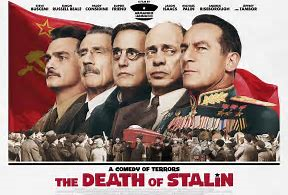The film ‘The Death of Stalin’ is a tour de force. Taken from a French book of the same name, financed and produced by French companies. Superbly written, acted, filmed, mostly by British filmmakers. (Why could the British financial institutions for whose benefit the whole British economy is geared, not have expressed financial confidence in this brilliant enterprise?)

‘The Death of Stalin’ conveys the grinding terror of post war Soviet Russia and the crazy chaos around and after the Communist dictator’s death. ‘Based on real events’ and on real people. Each nasty character is distinctive and believable, verging on caricature, yet never losing touch with the grimly real history. Yes Stalin did have his close colleagues play silly, degrading, games and watch American cowboy movies. Yes the whole population knew someone who had been dragged off in the night by the State Security Police and half expected, any night, to be on the ‘list’ for forcible removal, torture, exile, execution. (The composer Dmitri Shostakovich sometimes slept in the hallway so that when ‘they’ came, his family would not be disturbed.) Yes Soviet leaders were coarse and sex-obsessed. I remember an official Soviet ‘Peace Delegation’ being received by the Town Council of Belper, Derbyshire in the 1980s. During the break for refreshments three good Soviets, including an Orthodox Bishop, did not realise that I could understand the gist of their lewd conversation about the body of a female Councillor. Yes when Stalin had the stroke which finally killed him he was listening to a record of a Mozart Piano Concerto which had been made in the night after he had heard it broadcast and had ‘requested’ a record of the unrecorded broadcast. Yes the pianist was Maria Yudina who had written to Stalin critically.
But no, Maria Yudina’s note was not as harsh as in the film. The Concerto had not been recorded the night before Stalin died but nine years previously. Neither did Yudina bargain for money, as in the film. Stalin was so pleased with the recording that he sent Yudina 20,000 roubles. She replied with a note assuring Stalin of her prayers, calling him to repent for his many sins, and explaining that she had given the money to her church. All expected Stalin to show some displeasure at the note, maybe a curling of the tip of his nose. This would have been enough for the night-time hammering on her door. Stalin’s face remained blank. See https://forwardseeking.wordpress.com/tag/stalin/ and http://www.crossroadsculturalcenter.org/events/2011/9/17/maria-yudina-the-pianist-who-moved-stalin.html Stalin also never forgot. Was there a true connection, not as immediate as in the film, between Yudina’s playing, her thank you note, and Stalin’s stroke?
Why does the film, and the book on which it is based, distort details? Beria the vicious head of the State Security Police did not die without a trial the day of Stalin’s death. He died three years later after a typical show trial. Was it because the writers thought a more compressed, more dramatized version of reality would be ‘truer’ in some way? Or that they wanted to leave their personal imprint, changing history to reflect their art? Better to be accurate in detail as well as in broad sweep, more respectful to the actual, named, people.
More importantly, the film focuses entirely on the variegated human wickedness of the Soviet leaders and misses the wicked ideology which they followed. Anyone who visited Soviet Russia, as I did in 1974 and 1978, will have seen Communist Party slogans everywhere, especially on top of prominent buildings. These are absent from the film. Soviets lived a double life, the official narrative of present sacrifices for the glorious socialist future contrasting with the desperate struggle for survival, for human warmth. Life was always cloaked in pompous rhetoric; atrocities cloaked in official justification. The ideology was not a minor detail, as in the film, but a major feature of public and private life, a necessary part of the grinding terror.
If we are to learn from history, as the makers of ‘The Death of Stalin’ would want, we must see more clearly the dangers of idolatrous ideology – whether Communist, racial-Fascist, Free Market, or Islamist. Each demands belief in a better world ahead for which bloody struggle is necessary now. People other than the ideological leaders are made to pay the price. Life becomes grim: over-controlled and diminished and fearful
Life is not to be lived in the service of the great Communist, Capitalist or Islamist dream, it is to be lived as an expression today of love of God and love of our neighbour. Maria Yudina, in her piano playing and living, expressed this counter-cultural love. This is fullness of life, tree freedom, based on full truth, with no distortions.
Roger Harper
Please comment: